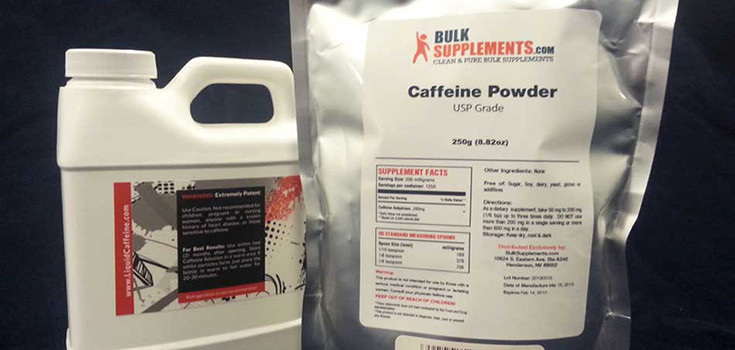FDA Sends Warning Letters to Makers of Potentially Deadly Powdered Caffeine Products
FDA Sends Warning Letters to Makers of Potentially Deadly Powdered Caffeine Products
A teaspoon of powdered caffeine = 28 cups of coffee
Five manufacturers of powdered caffeine have been informed by the FDA that they must stop producing some of their products, provide measuring devices for their products, or package their products in smaller amounts after the agency found that some packages of the substance contained as much as 50,000 servings of caffeine.
that they must stop producing some of their products, provide measuring devices for their products, or package their products in smaller amounts after the agency found that some packages of the substance contained as much as 50,000 servings of caffeine. [1]
The FDA called the products in question “potentially dangerous” and said they present “a significant or unreasonable risk of illness or injury.” The consumer advocacy group, the Center for Science in the Public Interest, petitioned the FDA to ban the sale of pure caffeine earlier this year.
A mere teaspoon of powdered caffeine is the equivalent of about 28 cups of coffee. A tablespoon of the drug in its purest form can kill. A 100-gram package of powdered caffeine is roughly the equivalent to 400 “tall” Starbucks coffees, 1,250 cans of Red Bull or 3,000 cans of Coke . The FDA publicly warned of the dangers of powdered caffeine last year after two young men accidentally overdosed on the substance and died.
The FDA’s main issue with powdered caffeine is that it is only safe in very small amounts, which are nearly impossible to measure. Teaspoons aren’t an accurate measuring tool due to variations in how the powder is packed. The agency said on its website that a precise scale is needed to measure out safe amounts, noting that “the difference between a safe amount and a toxic dose of caffeine in these pure powdered products is very small.” Caffeine overdose can lead to a rapid or dangerously erratic heartbeat, seizures, and even death.
The Center for Science in the Public Interest applauded the steps taken by the FDA, but said a total ban on powdered caffeine was the only way to keep the public safe. Laura MacCleery, the center’s regulatory affairs director, said:
“People assume something this dangerous would not be sold to consumers in this form. They are used to seeing warning labels and childproof caps on aspirin. And this is just a zip-lock bag.”
Related: States Ban Powdered Alcohol Before its Release
Packages of powdered caffeine can be purchased everywhere from gas stations to online websites.
Bridge City Bulk is one of the companies the FDA sent a warning letter to. Two of the company’s products are sold in packages ranging from one kilogram to 25 kilograms. The 10-kilogram package is equivalent to 1,230 teaspoons of powdered caffeine, or 50,000 servings. The agency told Bridge City Bulk to “take prompt action to correct the violations” and said that the products “are packaged to contain an amount that would be lethal to many consumers.” If the company fails to comply with the agency’s warning, health regulators could seize its product or stop it from producing more.
Jeffrey Stratton, Bridge City Bulk’s founder, said in an e-mail to The New York Times that the company stopped producing the products immediately and that his firm had received “no product complaints at any time, ever.” [1]
Hard Eight Nutrition, Kreativ Health, PureBulk and SmartPowders also received FDA warning letters. The manufacturers have 15 days to respond.
| About Julie Fidler: | |
| Julie Fidler is a freelance writer, legal blogger, and the author of Adventures in Holy Matrimony: For Better or the Absolute Worst. She lives in Pennsylvania with her husband and two ridiculously spoiled cats. She occasionally pontificates onher blog. | |
Other Popular Stories:

Post a Comment